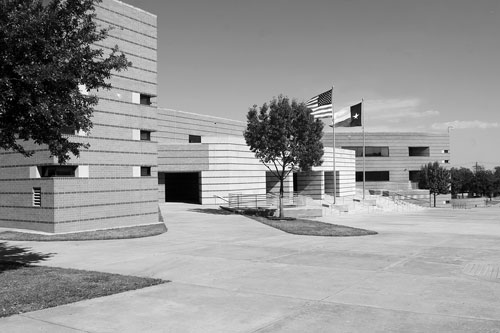
Townview Magnet Center will be forced to cut its full time staff from 90 people downn to 25 in DISD’s projected budgets in order to cope with reduced funding from the state, while other public schools are only being faced with staff cuts of 15 to 30 percent. (Photo courtesy DISD)
The Texas Legislature is currently considering a $9.8 billion cut to education. Should it pass, Dallas Independent School District (DISD) will be faced with some tough choices to make – especially with its top ranking magnet schools, Townview Magnet Center and Booker T. Washington High School for the Performing and Visual Arts.
“We are looking at anywhere from $150 million to $259 million, depending on what the Texas State Legislature ends up doing,” said Lew Blackburn, the DISD trustee for Townview’s district. “We’re preparing for the best scenario and the worst scenario.”
The proposed budgets could cause drastic staff cutbacks at the magnet centers. Townview would get its full-time staff of 90 cut to 25 and Booker T. Washington would go from 59 to 25.
Townview is a conglomeration of six magnet schools including law, health, business, science and engineering, education and social services and a gifted and talented magnet. Students take specialized classes in these schools and get their core classes, such as social studies and English, from the Academic Center that serves all schools.
The majority of the staff cuts will be from the Academic Center, according to David Lee, a social studies teacher in the academic center and one of the leaders of Townview’s teachers union.
“We don’t know how that would work. Would they force the specialized teachers to teach core subjects? If so, would the specialized classes go away?” he said. “Any way you twist it, Townview won’t be as effective of a school.”
Townview has continually ranked at the top of the best schools in the United States. In 2010, the Talented and Gifted (TAG) Magnet ranked No. 1 in Newsweek’s annual rankings, the Science and Engineering Magnet ranked fifth. Booker T. Washington has ranked in the top 120 schools in the country for the past several years.
But even given this success, if the budget is approved by the DISD Board of Trustees, Townview and Booker T. Washington seem to be taking a bigger hit than regular high schools in the area.
In both scenarios, other schools are forced to let go of anywhere from 15 to 30 percent of their staff while the magnet programs are being hit with at least 50 percent cuts in the best-case scenario.
“I don’t know why that is,” Lee said. “You would think they would want to keep their best schools well funded.”
Lee said at the beginning of the school year that Michael Hinojosa, DISD’s superintendent, sent a video to the district’s staff that said smaller schools were inefficient and their budget’s needed to be cut. He feels like the district’s administration is now acting on those words.
Blackburn defended the administration, saying that he didn’t believe “anyone wanted to hurt the magnet programs.”
Jim Kipp, president of the parent teacher association for the Science and Engineering Magnet, said that the district is playing a bad numbers game.
“They are just applying a formula,” he said. “They looked at how much they needed to cut and then put the teacher to student ratio at the same rate for every school.”
So because Townview and Booker T. Washington have small student teacher ratios, they took the biggest hit.
“Putting 30 students in a classroom at Townview or Booker T. is not the same as putting 30 students in a classroom at Hillcrest or Sunset. You can’t teach specialized programs to 30 students at one time. It’s impossible,” Kipp said. “I mean, how would Booker T. teach a piano class to upwards of 30 students at one time?”
State Representative Eric Johnson, who serves the area where Townview is located, said that across the state schools are looking at drastic student to teacher ratio hikes. He said some DISD classrooms may have as many as 35 students in each classroom.
Rolando Velasquez, a student at Townview’s Law Magnet, said that he thinks his school would suffer greatly with an increase in the student to teacher ratio.
“Thirty-five plus kids per classroom could devastate the educational gains we have made,” Velasquez said. “We cannot afford to maintain our academic excellence with the extra burden on the teachers, who are so valuable to us. What makes the system so different is the small teacher to student ratio and that is why we are able to do so well.”
Johnson said he favors using Texas’ $9 billion “rainy day fund” to help solve the budget problems and alleviate the need to cut so many teachers. While the fund has been approved for use this year, it has not been approved
going forward.
“[The rainy day fund] was meant to provide additional funds during years when there are disruptions in the economy,” Johnson said. “The budget shortfall we face this session is unprecedented in its size and scope. If this isn’t the time to use the resources of the Rainy Day Fund then I don’t know when would be.”
Johnson said that he feels the state budget cuts are a mistake that will cost the state “far more” than it will save in the budget.
He thinks that the state should focus more on finding additional sources of revenue “through modifications of the hundreds of tax exemptions that exist in our current state tax system.”
But there aren’t many in the Texas Legislature who agree with this plan. In fact, there are few that agree on any plan. Few believe that the state will agree on a budget before the legislative session ends on May 30. The governor will then have to call a special session to pass the budget. A recently released statement by Johnson’s office said that there is already talk of the governor doing this in July.
Given that school districts are currently required to release their budgets to the state in June, not releasing the state’s budget until July leaves schools unable to make the June deadline, according to Michael S. MacNaughton of Dallas Friends of Public Education.
“I’m sure there would be some sort of a waiver allowing schools to present their budget later but that doesn’t help much when school starts in August,” he said. “At some point, school districts have to know how many teachers to cut and where to trim their budgets.”
Kipp stressed the need for legislators to push off politics and focus on education. He said the state needs to figure out another way to fix the budget instead of on the backs of students. “The most dire cuts are to the magnet high schools. But it doesn’t mean that this is OK for the other schools. This is a tragedy for all Dallas high schools.”
He said that because of the budget, the magnet schools’ high rankings will “steadily decline.”














